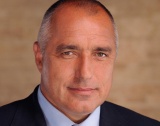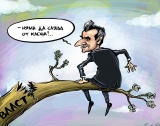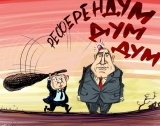АБОНАМЕНТ ЗА НОВИНИ [X]
Борисов защити „Южен поток”
 09:45 | 21.11.2012
09:45 | 21.11.2012 800
800  коментари 0
коментари 0
Българският премиер защити споразумението, сключено между страната му и Русия за изграждането на спорния газопровод "Южен поток" за 16 милиарда евро на българска територия, като каза, че то има по-добри перспективи от подкрепяния от Брюксел план за конкурентен газопровод и ще е изгоден за Европа. Това съобщава в интернет страницата си британският в. "Файненшъл таймс" в статия на пратениците си в София Нийл Бъкли и Тони Барбър.
Бойко Борисов каза, че никакви държавни средства няма да бъдат изразходвани за българския участък от тръбата. Проектът "ще създаде нови работни места в България", а следващото правителство ще събира транзитни такси от транспортирането на газа и благодарение на тези средства "ще може да плаща по-високи пенсии и да построи музеи и стадиони", заяви Борисов пред "Файненшъл таймс".
Борисов опроверга съобщенията в медиите, че за да изплати своя дял в строителството на газопровода на територията си България няма да получава транзитни такси в продължение на 15 години. Той се учуди на въпросите дали проектът е перспективен предвид на спадащото търсене на газ и появата на нови източници след бума на шистовия газ в Северна Америка. Подобни въпроси, по
думите на Борисов, биха могли да се отнасят по-скоро до газопровода "Набуко" - подкрепяния от ЕС проект за доставка на газ от Каспийския басейн през Кавказ, и за който Борисов каза, че е "основен приоритет" на България. По думите на българския премиер, десетки милиони евро са похарчени за "Набуко" досега,
само за администрирането му, "а ние все още не знаем кой ще доставя газа за тръбопровода". Борисов предупреди също, че докато не се нормализира обстановката в Нагорни Карабах - населения предимно с арменци анклав в Азербайджан - строителството на транзитен тръбопровод през територията на
Азербайджан ще продължава да е рисковано начинание. Борисов добави, че като министър-председател вече е отменил два "големи проекта", подкрепяни от Русия - за нефтопровода "Бургас-Александруполис" и АЕЦ "Белене".
"Посочете ми името на някой премиер в света, който е отменил два от три проекта с Москва", заяви Борисов пред "Файненшъл таймс".
Връщайки се на темата за значението на "Южен поток" за икономиката на страната, Бойко Борисов заяви, че благодарение на този и други проекти на Черно море България след шест години ще може сама да задоволява нуждите си от газ. "Затова в нашия /нов/ договор с Москва поставихме текст, в който се казва, че ще купуваме газ от Русия /само/ шест години", добави българският премиер, цитиран от британския вестник. "Заслужаваме похвала за това. Не е лесно за малка страна като нашата, на Балканите, и където влиянието на руската общност е огромно, да отмени два от три големи проекта и да избере истинска /енергийна/ диверсификация", цитира "Файненшъл таймс" думите на българския премиер.
Ето и текстът в оригинал: Borisov defends pipeline deal with Russia By Neil Buckley and Tony Barber in Sofia Bulgaria’s prime minister has defended his country’s agreement with Russia to build the controversial €16bn South Stream gas pipeline across his country, saying it has better prospects than a Brussels-backed rival plan and will benefit Europe. Boyko Borisov said no state money would go into the Bulgarian sector of the pipeline to bring Russian gas under the Black Sea and through the Balkans, which would be project-financed and receive no state guarantee from Sofia.
“It will create jobs in Bulgaria,” Mr Borisov told the FT. “The next [government] will collect transit fees [on gas transported through the pipeline] and will be able to pay higher pensions and build museums and sports stadiums.” Bulgaria last week became the final Balkans state to reach agreement with Russia on South Stream, which allowed Gazprom and its consortium partners to take a final investment decision on the project. Sofia also received a 20 per cent price discount on a new, six-year gas supply contract from Gazprom, starting in January. Gazprom and the other shareholders – Italy’s Eni, Germany’s Wintershall and France’s EDF – will begin construction on the Black Sea section of the pipeline on December 7. But the agreements come at a sensitive time. The European Commission in September opened an antitrust probe into whether Gazprom was abusing its dominant position in eastern European markets. Brussels officials have said that probe will examine whether Gazprom linked offers of cheaper gas for countries such as Bulgaria to participation in South Stream. Mr Borisov was once a private security guard, whose clients included the former communist leader Todor Zhivkov, and later mayor of Sofia. As premier since 2009, he has steered carefully between the EU, which Bulgaria joined in 2007, and Russia, with which it has strong cultural links. Mr Borisov denied media reports that Bulgaria would take no transit fees from South Stream for up to 15 years, to pay for its share of construction of the Bulgarian section. He expressed surprise at questions on whether the project would be viable given flagging gas demand growth and proliferating supply sources following the shale gas boom in North America. Such questions, he said, might instead apply to Nabucco – the EU-backed project to bring gas from the Caspian basin via the Caucasus, which Mr Borisov said had been Bulgaria’s “top priority”. “But tens of millions of euros were spent on Nabucco so far, to administer it, and still we don’t know the source of gas for the pipeline,” he said. Nabucco has been scaled back to a shorter project, Nabucco West, that would take gas from the Turkish-European border into central Europe. The leading contender to bring Caspian gas to that point is now the planned Trans-Anatolian Pipeline between Turkey and Azerbaijan. But Mr Borisov warned that while the conflict in Nagorno-Karabakh, the mostly Armenian enclave in Azerbaijan, was unresolved, any transit pipeline through Azerbaijan would not be secure. He added that as prime minister he had already cancelled two Russian-backed “grand projects”. These were the Burgas-Alexandroupolis oil pipeline to carry Russian and Caspian oil from the Black Sea to the Greek Aegean, on environmental grounds, and the Belene nuclear power plant in Bulgaria, because of cost. “Give me the name of any prime minister in the world who has cancelled two projects out of three with Moscow,” said Mr Borisov. “I would have asked the question, how did this government find the political will to grant a concession on the Black Sea, where we know there are gas and oil deposits,” he continued, “not to a Russian company, but to a consortium of three major European companies – Total, OMV and Repsol?” Mr Borisov said that and other Black Sea projects would enable Bulgaria within six years to meet its own gas needs. “That is why in our [new] contract with Moscow we put text saying we will buy gas from Russia for [only] six years,” the Bulgarian premier added. “We deserve to be congratulated on that. It is not easy for a small country like ours, in the Balkans, and where the influence of the Russian community is huge, to cancel two of the three major projects, and to opt for real diversification.”
| Tweet |
|













